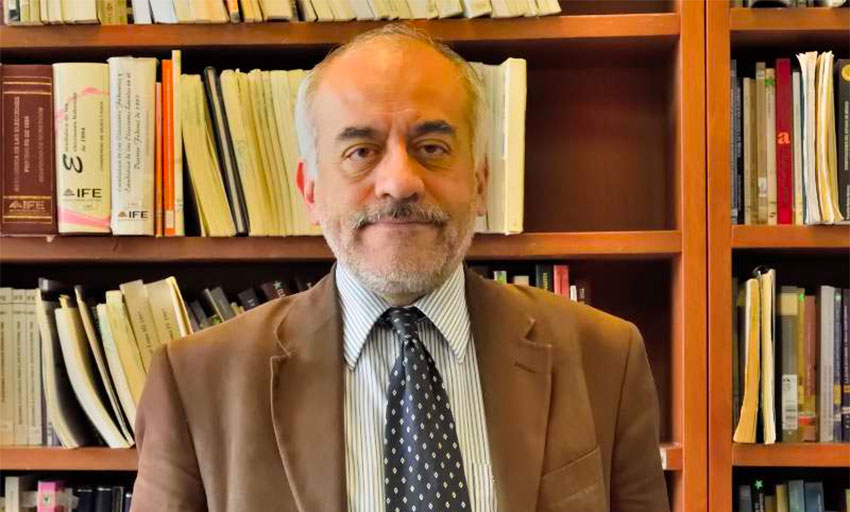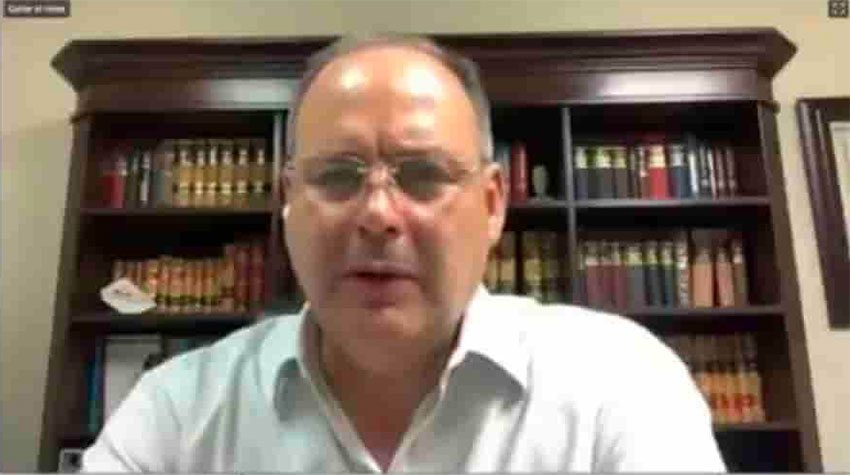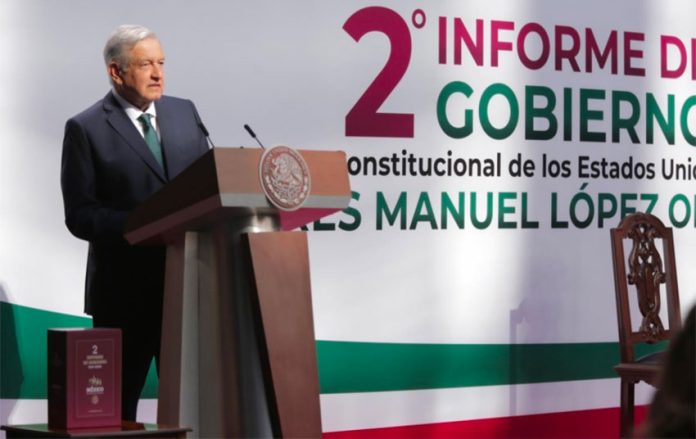President López Obrador’s second annual report to the nation got a cool reception from several analysts and business leaders, some of whom described it as self-congratulatory and clichéd.
José Antonio Crespo, a historian and political scientist at CIDE, a Mexico City university, said the president’s address, delivered Tuesday morning at the National Palace in Mexico City, lacked reference to any shortcomings of the government and proposals that might remedy those faults.
“I would have liked him to recognize that things aren’t going well and to have announced some remedies but this will never happen with President López Obrador,” he told the newspaper El Universal.
Crespo criticized the president for not acknowledging the millions of informal sector workers who have lost their jobs or income due to the coronavirus pandemic and as a result have fallen into poverty. He also rebuked him for taking credit for things over which he has no influence.
“It’s not just López Obrador, all presidents adopt a triumphalist tone in their [annual] reports, … attributing things that don’t depend on the government as a triumph of it; [migrants’] remittances for example,” Crespo said.
Gildardo López Hernández, a political analyst and professor at the Panamerican University’s school of government and economy, also criticized López Obrador for not acknowledging his government’s errors, charging that his address amounted to nothing more than “self-praise.”
“Self-criticism was conspicuous by its absence. There wasn’t a single reference, not even a veiled one, to something that should be changed,” he said.
López described the president’s report as trite given that he focused heavily on his pet subject – combatting corruption – and used well-worn catchphrases such as “for the good of all, the poor come first.”
He asserted that there was no doubt that López Obrador’s address was designed to win votes at the 2021 midterm elections, pointing out that it focused on topics that helped him win the 2018 election.
Víctor Manuel Alarcón, a political scientist at the Metropolitan Autonomous University in Mexico City, described the president’s address as self-congratulatory due to its focus on the government’s apparent achievements in combatting corruption and reducing crime, and questioned the assertion that most offenses have declined by about 30% since he took office.
“That piece of information isn’t supported or is of very dubious veracity at least,” he said.

Alarcón also said that López Obrador’s claims that the response to the pandemic has been successful and that the government has worked well with state governors are “a little doubtful.”
“There are important parts [of the address] that would be worth questioning,” he said.
Gabriel Pérez del Peral, also a professor at the Panamerican University, charged that López Obrador’s report was “removed from reality.”
He challenged the president’s claim that the economy will undergo a V-shaped recovery from the coronavirus-induced downturn, predicting it will recover slowly due to the lack of government support.
Like López Hernández, Pérez contended that López Obrador’s address was formulated with the 2021 elections in mind.
CI Banco analyst James Salazar said the president failed to offer anything new in his near hour-long speech.
“He focused a lot on the subjects he likes: combating corruption, progress in the welfare programs. He tried to highlight some security and economic issues but there wasn’t anything else,” he said.
Two prominent business leaders were also critical of the president’s address – and the government’s performance – although one was complimentary of the fight against corruption.
Mexican Employers Federation (Coparmex) president Gustavo de Hoyos challenged López Obrador’s claim that the “best government” is in office at the “worst time,” the latter a reference to the dual health and economic crisis caused by the coronavirus pandemic.
He noted that homicides are on the rise – Mexico is on track to record its most violent year ever – and asserted that there could be 180,000 murders during the president’s six-term, a figure that would easily exceed the number recorded during the administrations of former presidents Enrique Peña Nieto and Felipe Calderón.
De Hoyos said the savings touted by López Obrador in his address had resulted in a weakening of the state and its institutions.
“According to official calculations cited by [the president], by not allowing corruption and by having an austere government they have been able to save about 560 billion pesos,” he said in a statement.

However, the generation of the savings “has involved a dismantling of institutions and a suffocation of the capacities of the state,” de Hoyos said, describing the López Obrador administration as “the worst government at the worst moment.”
The Coparmex chief also said that López Obrador’s address contained no new proposals, arguing that it would have been a good time to announce a “great national agreement” between the government and private sector aimed at remedying the economic damage caused by the pandemic.
De Hoyos said the private sector is prepared to collaborate but that the latter has ignored the former’s approaches.
Carlos Salazar Lomelín, president of the Business Coordinating Council (CCE), an umbrella organization representing 12 business groups, was critical of the government for refusing to take on more debt to support families amid the economic crisis.
(The president declared proudly in his address that Mexico would overcome the economic crisis without increasing public debt).
“We insist on the need to take on debt to … support Mexican families,” Salazar said, adding that spending on social programs should be increased so that they reach those currently excluded.
“There is no doubt that we have to support the most needy,” he said.
The CCE president said that there were good, bad and ugly aspects of the government’s rule since López Obrador took office 21 months ago. In the first category is the government’s crusade against corruption, Salazar said.
“The best of everything has been … the fight against corruption,” he said, adding that “Mexico needed to focus its efforts” in the area because it had become entrenched in public and everyday life.
The “bad” of the government’s term to date has been the coronavirus pandemic and the heavy blow it has dealt to the economy while the “ugly” is the persistent violence that the López Obrador administration has been unable to quell, Salazar said.
Source: El Financiero (sp), El Universal (sp), Reforma (sp)
